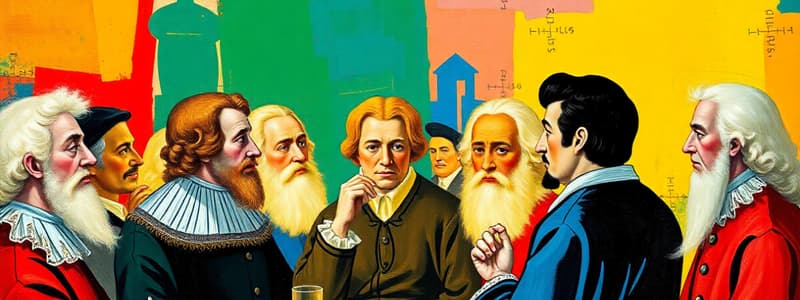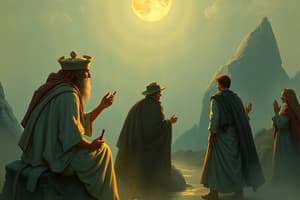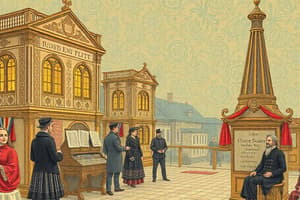Podcast
Questions and Answers
What role did salons play during the Enlightenment?
What role did salons play during the Enlightenment?
- They were venues for scientific experiments conducted by men.
- They were primarily for middle to upper-class women to discuss ideas. (correct)
- They were exclusive clubs for male philosophers only.
- They served as gathering places for the lower class to protest.
Which statement best describes Adam Smith's contributions?
Which statement best describes Adam Smith's contributions?
- He believed in interventionist economic policies.
- He introduced the idea of wealth redistribution.
- He is known for the concept of economic liberalism. (correct)
- He focused solely on the agricultural economy.
What does the concept of 'Tabula Rasa' signify?
What does the concept of 'Tabula Rasa' signify?
- A method of governance based on strict rules.
- The belief that humans are inherently evil.
- A theory that all humans are born with predetermined skills.
- The idea that individuals start as a blank slate. (correct)
Who was Rahel Varnhagen?
Who was Rahel Varnhagen?
Which philosopher wrote 'What is Enlightenment?'
Which philosopher wrote 'What is Enlightenment?'
What was the outcome of the Tennis Court Oath?
What was the outcome of the Tennis Court Oath?
What was a significant consequence of the Fall of the Bastille?
What was a significant consequence of the Fall of the Bastille?
Which statement accurately represents Olympe de Gouges's contributions?
Which statement accurately represents Olympe de Gouges's contributions?
What was the primary goal of émigrés during the French Revolution?
What was the primary goal of émigrés during the French Revolution?
Which group was known for rejecting aristocratic fashion during the French Revolution?
Which group was known for rejecting aristocratic fashion during the French Revolution?
What role did the Committee for Public Safety play during the Reign of Terror?
What role did the Committee for Public Safety play during the Reign of Terror?
What significant event happened on the Eighteenth of Brumaire?
What significant event happened on the Eighteenth of Brumaire?
Which statement is true regarding Napoleon's Self-Coronation in 1804?
Which statement is true regarding Napoleon's Self-Coronation in 1804?
What principle was outlined in the Napoleonic Code?
What principle was outlined in the Napoleonic Code?
Which event did Toussaint Louverture lead during the 1800s?
Which event did Toussaint Louverture lead during the 1800s?
How did Napoleon practice nepotism across Europe?
How did Napoleon practice nepotism across Europe?
Which group was comprised of rich white people in Haiti who opposed the equality of People of Color?
Which group was comprised of rich white people in Haiti who opposed the equality of People of Color?
What was the main purpose of Father Miguel Hidalgo's El Grito de Dolores?
What was the main purpose of Father Miguel Hidalgo's El Grito de Dolores?
Which event marked the final defeat of Napoleon, leading to his exile?
Which event marked the final defeat of Napoleon, leading to his exile?
What does the principle of the Balance of Power aim to achieve?
What does the principle of the Balance of Power aim to achieve?
Which of the following best describes Luddism?
Which of the following best describes Luddism?
Who was a prominent pioneer of Utopian Socialism?
Who was a prominent pioneer of Utopian Socialism?
What was the significance of the Carlsbad Resolutions?
What was the significance of the Carlsbad Resolutions?
What is the primary focus of Socialism?
What is the primary focus of Socialism?
Flashcards are hidden until you start studying
Study Notes
Salons and Enlightenment Thinkers
- Salons were social gatherings held in private homes, particularly popular during the Enlightenment era.
- They provided a space for intellectual discourse and debate, particularly for women who were excluded from coffeehouses.
- Philosophes were French intellectuals who championed Enlightenment ideals.
- Voltaire, a prominent philosophe, employed satire to criticize societal norms and is often considered the father of modern satire.
- Adam Smith, a Scottish economist, advocated for free markets and the "invisible hand" of capitalism, outlined in his influential work The Wealth of Nations.
- Smith argued for government protection of intellectual property through patents.
- John Locke was an English philosopher who championed the concept of government with the consent of the governed.
- Tabula Rasa is the belief that humans are born with a blank slate, molded by experience and environment - a central tenet of Locke's philosophy.
- Natural Rights, fundamental rights inherent to all humans, were a core concept of the Enlightenment.
- Rahel Varnhagen was a renowned salon hostess in Berlin, known for facilitating intellectually stimulating discussions.
- Jean-Jacques Rousseau, a Swiss-born philosopher, is credited with the concept of The Social Contract, arguing that legitimate government derives its power from the consent of the governed.
The French Revolution
- The French Revolution was a period of social and political upheaval in France from 1789 to 1799 that overthrew the monarchy and led to the establishment of a Republic.
- France was facing a severe economic crisis, coupled with the King's resistance to reform.
- The Estates-General, a legislative body representing the three estates (clergy, nobility, and commoners), was convened by Louis XVI in 1789 to address the financial crisis.
- Louis XVI, the king of France, was ultimately overthrown and executed due to his inability to manage the increasingly difficult financial situation and his resistance to reforming the government.
- Marie Antoinette, the Austrian-born Queen and Louis XVI’s wife, was also executed during the revolution.
- The Bourgeoisie, France’s middle class, supported the revolution, seeking political power and economic freedoms.
- The Tennis Court Oath marked a pivotal moment where members of the Third Estate, representing the commoners, vowed to continue their meetings until a new constitution was established, demonstrating their desire for representation and an end to taxation without representation.
- Olympe de Gouges, a prominent feminist and playwright, wrote The Declaration of the Rights of Woman and the Female Citizen, advocating for equal rights for women and challenging traditional patriarchal structures.
Key Events and Figures in the French Revolution
- The Fall of the Bastille, on July 14, 1789, symbolized the start of the French Revolution. The storming of the Bastille, a royal prison, marked the triumph of the people over the monarchy.
- Émigrés, primarily nobles and members of the aristocracy, attempted to flee France and restore the monarchy from abroad.
- Sans-Culottes, a group of working-class revolutionaries, rejected traditional aristocratic fashion, symbolizing their rejection of the old order. They played a significant role in the revolution, demanding radical changes and greater equality.
- Robespierre, a prominent leader of the Jacobin Club, a radical faction that advocated for the Reign of Terror, aimed at rooting out “enemies of the revolution.
- The Committee of Public Safety, a powerful governing body during the Reign of Terror, was responsible for directing the revolutionary war effort and eliminating perceived enemies of the revolution.
- The Directory, a five-man executive committee, governed France from 1795 until it was overthrown by Napoleon Bonaparte in 1799.
- Regicide, the killing of a monarch, was a significant event during the revolution and a symbol of the people's defiance of the old order.
- The Guillotine, a tool of execution utilized during the Reign of Terror, was seen as a humane method of beheading.
- The Thermidorian Reaction, marked the end of the Reign of Terror, with people turning against Robespierre and his radical policies.
- The Consulate, a transitional government established after the Directory, was a three-man executive body that eventually led to Napoleon taking power as First Consul for life.
Napoleon Bonaparte
- Napoleon Bonaparte, a military genius and skilled leader, rose to prominence during the revolution and eventually took control of France, establishing himself as First Consul before eventually becoming Emperor of France.
- Lucien Bonaparte, his brother, played a key role in the 18th of Brumaire, the coup d'état that led to Napoleon's seizure of power.
- The Eighteenth of Brumaire, November 9, 1799, marked the day Napoleon overthrew the Directory and established the Consulate.
- Napoleon, recognizing the importance of religion for social cohesion, signed the Concordat with the Papacy, formally recognizing Catholicism as the religion of France while maintaining state control over the church.
- The Organic Articles were additional regulations designed to keep the Catholic Church under state control.
- Nepotism was a common practice employed by Napoleon, placing close relatives in positions of power.
- The Louisiana Purchase in 1803, where Napoleon sold the Louisiana Territory (covering large parts of the U.S. Midwest) to the U.S. for a mere 3 cents an acre, provided Napoleon with funds for his military campaigns.
- Napoleon's Self-Coronation, in 1804, marked his assumption of absolute power, disregarding centuries of tradition.
- The Napoleonic Code was a legal code instituted by Napoleon, emphasizing equality before the law but with significant limitations for women who had few legal rights. It also stifled female education.
The Haitian Revolution
- The Haitian Revolution took place in 1804 and was inspired by the ideals of the French Revolution. It led to the establishment of the first independent Black republic in the Americas.
- Toussaint Louverture, a skilled military leader, led the revolution. He was referred to as the "Napoleon of Haiti" due to his strategic abilities.
- Free People of Color, including freed Black individuals and mixed-race peoples (Creoles), sought equal rights during the revolution.
- Grand Blancs, wealthy white landowners, resisted the drive for equality and maintained control of the island’s wealth.
- Petit Blancs, a group of poor white people, believed they should be richer than the Free People of Color, relying on notions of white supremacy.
Other Important Events and Figures
- The Peninsular War (1807-1814) was a conflict between France and Spain, marked by guerilla warfare and resistance. It significantly drained French resources and contributed to Napoleon’s eventual downfall.
- The war resulted in the Portuguese royalty fleeing to Brazil.
- Father Miguel Hidalgo was a Mexican priest who played a key role in the Mexican War of Independence from Spain.
- El Grito de Dolores, the famous "Cry of Dolores", was a speech written by Father Hidalgo in 1810, calling for Mexican independence.
- Simon Bolivar, a revolutionary leader in South America, led independence movements throughout the continent, establishing Gran Colombia.
- Jose de San Martin, an Argentinian general, also played a key role in South American independence movements.
- The Battle of Jena (1806) was a crushing defeat of Prussian forces by Napoleon, demonstrating his military superiority at the time.
- The Confederation of the Rhine, established after the defeat of Prussia, was a coalition of German states under Napoleon's control.
- Waterloo, in 1815, marked Napoleon’s final defeat and signaled the end of his reign.
- Klemens Von Metternich, an Austrian statesman, was a prominent figure in the post-Napoleonic era, advocating for conservatism and the restoration of the old order.
- The Congress of Vienna (1814-1815) was a major international conference aimed at re-establishing order in Europe following Napoleon’s downfall.
- The Balance of Power was a principle promoted at the Congress of Vienna, aiming to prevent any single nation from dominating Europe.
- Conservatism, an ideology emphasizing tradition and resistance to change, became influential in Europe during this period.
- The Carlsbad Resolutions (1819) were a set of restrictions imposed on universities, prohibiting students and teachers from discussing revolutionary ideas and ensuring the suppression of liberal and radical thought.
The Industrial Revolution and Social Change
- The Industrial Revolution was a period of rapid technological advancements and industrialization beginning in Great Britain during the late 18th century and spreading throughout Europe.
- James Watt, an engineer, played a pivotal role by improving the efficiency of the steam engine, which became an essential engine for powering factories.
- Luddism was a social movement in early 19th-century England that protested the introduction of new machines that were displacing workers.
- Luddites, named after the mythical Ned Ludd, destroyed machinery, which was seen as a threat to their livelihoods.
- Socialism, an ideology that advocates for collective ownership and control of the means of production, emerged during the Industrial Revolution.
- Utopian Socialism was a branch of socialism that aimed to establish ideal cooperative societies.
- Robert Owen, a prominent Utopian socialist, established communities based on cooperation, sharing, and social reform.
- Louis Blanc, a French socialist, argued for workers' control of production.
- Karl Marx and Friedrich Engels developed scientific socialism, which became known as Marxism. They authored the Communist Manifesto arguing for a classless society achieved through revolutionary action.
- The Proletariat, the working class, was seen by Marx as the revolutionary force driving change.
- Class Struggle, a key component of Marxism, was the conflict between the bourgeoisie (owners of the means of production) and the proletariat.
- Das Kapital, a seminal work by Marx, analyzes capitalism and argues for the inevitability of its demise.
Nationalism and Political Reforms
- Nationalism, the idea of a nation-state with a shared culture, language, and history, became increasingly important in the 19th century.
- The Reform Act of 1832, a significant piece of legislation in Britain, expanded voting rights by giving the middle class more political representation.
- Lord Earl Grey, the Prime Minister of Great Britain at the time, played a key role in the passage of the Reform Act.
- The Zollverein (1834), a German customs union, was established to promote economic unity among German states.
- The Repeal of the Corn Laws in 1846 removed tariffs on imported grain, reducing food prices and benefiting consumers.
Studying That Suits You
Use AI to generate personalized quizzes and flashcards to suit your learning preferences.




